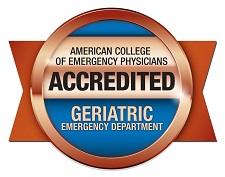Little Falls Hospital Emergency Department
For life-threatening emergencies, call 911
Contact
Phone:
Hours
Hours: Open 24/7 for emergencies
Press #1 for Emergency Department
ACEP Geriatric Emergency Room Accredited — Learn More

If you have an emergency, follow these steps:
Go to the nearest emergency room (ER)
If you can, go to the hospital ER closest to you right away. If you cannot get there right away, call 911 or your police emergency number.
Call your doctor or primary care provider
Tell your primary health care provider about the emergency. Call within 24 hours of going to the ER. If you cannot call, have someone call for you. Go to your primary care provider (not the ER) for any follow-up care.
When to Use the Emergency Room (ER)
Dangers to your life
- Stroke, facial drooping, weakness in arm or leg
- Shortness of breath
- Motor vehicle crashes
- Psychiatric emergencies
- Choking
- Suicidal or homicidal feelings
- Severe bleeding
- Coughing or vomiting blood
- Blacking out (fainting), loss of consciousness
- Poisoning
- Allergic reactions
- Persistent vomiting
- Severe reaction to insect bites
- Head trauma
- Seizures
Dangers of permanent injuries
- Deep cuts or severe burns
- An attack by a person or animal
- Broken bones (often indicated by sudden severe pain and swelling)
When It’s NOT an Emergency
For illnesses and minor injuries that are not life-threatening, walk-in Convenient Care is available. Frequently treated conditions at Convenient Care include: colds and fever, sore throats, sinus infections, nosebleeds, rashes, minor cuts and burns, bumps and bruises, sprains and strains.
If a problem is not an emergency, follow these steps:
Call your doctor or primary care provider
If you don’t know the name of your primary care provider, call your health plan.
If you cannot call, have someone call for you.
Follow instructions
Your primary care provider will tell you what you should do.
You may be told to see your primary care provider right away. You may be told to go to the ER. Or you may be told to go to a convenient care center. Follow your primary care provider's advice.
Bassett Healthcare Network offers 24/7 emergency care services at all five of our hospital locations, as well as at our Tri-Town Campus. Emergency teams work collaboratively to treat emergency medical injuries and conditions, such as chest pain, head injury, seizures, poisoning, sexual abuse, severe burns, fractures. Emergency care is available at:
ACEP Geriatric Emergency Room Accredited

The American College of Emergency Physicians (ACEP) has awarded Bronze Level Geriatric Emergency Department Accreditation to all five of Bassett Healthcare Network’s hospital emergency departments. This signifies that those EDs incorporate best practices identified by the Society for Academic Emergency Medicine, Emergency Nurses Association, and American Geriatrics Society.
In short: seniors can count us for excellent emergency care.
Drug Collection Kiosk in Little Falls Hospital's Lobby
We're proud to offer drug collection kiosks at various locations throughout our network to help our community members clean out their medicine cabinets safely! Just bring your unneeded, unwanted, and/or expired medications to any of these kiosks for free, safe disposal — no questions asked.
At Little Falls Hospital, the drug collection kiosk can be found in the hospital lobby.

- This service is open to the public — you do not need to be a Bassett patient to participate.
- The program covers over-the-counter, prescription, and veterinary (pet) medications.
- Only pills and liquids can be deposited in the kiosks. Inhalers and sprays should be brought to one of the pharmacy locations to be collected at the pharmacy window.
- This program does not accept needles and other sharps. Patients should ask their primary care provider about properly disposing of sharps.
- Participants should only deposit medications prescribed to themselves, a dependent, or someone who is deceased.
- Medications do not need to be in their original containers.
- Thousands of Americans call poison control lines, get admitted to the hospital, or die each year due to home medication errors or accidental consumption. Eliminating unneeded medications can save lives — especially those of children, elderly people, and pets.
- Prescribed painkillers are often sought out by people struggling with addiction. Disposing of unneeded pain medications can help fight the opioid epidemic.
- Medications dumped in landfills or flushed down toilets contaminate soil, groundwater, rivers, and oceans. Returning drugs to hospitals and pharmacies to be properly disposed of protects wildlife and community water supplies.
